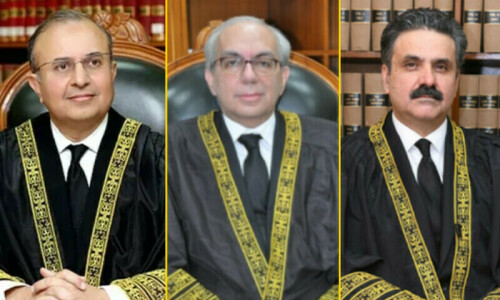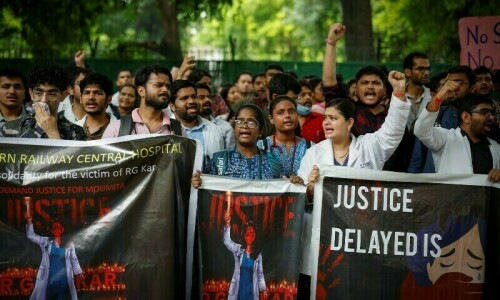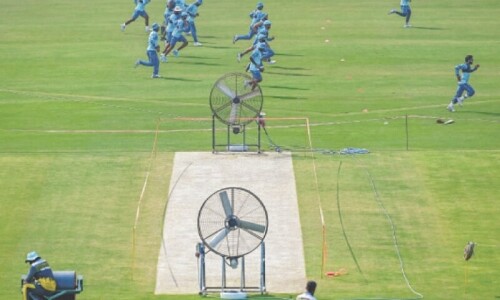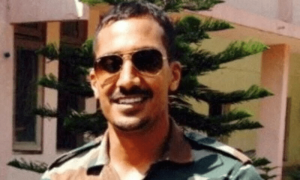ISLAMABAD/LAHORE: The army said on Monday it had launched a crackdown on terrorists suspected to be involved in the Lahore park attack and there were clear indications that a decision had been taken by the military high command to expand the operation throughout the province.
Army Chief Gen Raheel Sharif, who ordered raids on hideouts of terrorists in the province at a late-night military session on Sunday, presided over another meeting at the General Headquarters on Monday morning to review progress.
Intelligence agencies led operations in Lahore, Faisalabad, Multan and Muzzafargarh against seminaries and other targets linked to extremist and terror groups.
Personnel of army and Rangers carried out the operations. A number of arrests were said to have been made in addition to recovery of arms and explosives.
Several arrests made; operation to be spread across province
“Operations will continue with more leads coming in,” military spokesman Lt Gen Asim Bajwa said while announcing the start of the action.
The raids, according to a security source, were carried out on the basis of the technical evidence and initial information gathered by intelligence agencies in the aftermath of the bombing in Lahore’s Gulshan-i-Iqbal park on the Easter day in which at least 72 people, most of them women and children, were killed.
The attack was claimed by Jamaatul Ahrar faction of the Tehreek-i-Taliban Pakistan. It was not clear which of about five dozen banned groups operating in the province were being targeted in the first phase of the crackdown.
An intelligence source revealed that orders had been given for expanding the scope of the crackdown to all parts of the province and against all groups involved in acts of terror “without any discrimination”.
The army, it is said, had been long pushing the government to initiate action against Punjab-based extremist and terrorist groups, but the civilian government was dragging its feet on the matter, asking the military to identify the problem and leave it to the provincial law-enforcement agencies to neutralise the threat.
The reluctance on part of PML-N governments at the centre and in Punjab to agree to a military operation was out of concern that such a move could weaken the party’s hold in its bastion, where it has been in power since 2008.
A source familiar with the developments after the Lahore incident, which is the biggest terrorist attack after the Dec 2014 massacre of schoolchildren at the Army Public School in terms of the number of casualties, said that the military and intelligence leadership in its meeting on Sunday night concluded that it was beyond the capacity of civilian agencies to tackle the problem.
Hence, the military, instead of waiting for consultations with the civilian authorities, decided to go ahead with a large-scale effect-based operation, using all resources available at its disposal.
There has been no publicly reported conversation between Prime Minister Nawaz Sharif and Gen Raheel Sharif over the past two days with regard to the operation.
Prime Minister Nawaz Sharif, who addressed the nation on television and radio on Monday evening, reaffirmed his pledge to fight terrorism, but stayed short of announcing a major operation in Punjab.
He only said that he had directed law enforcement agencies not to spare patrons and facilitators of terrorists.
The absence of a clear announcement in the prime minister’s speech regarding a counter-terrorism offensive in the province reinforced the impression of civil-military differences over the operation.
The source clarified that contrary to the general belief that the action would be south Punjab-focused, it would be undertaken in all parts of the province.
Action against local facilitators
Teams of security agencies made several arrests in Lahore, Faisalabad and Multan on the first day of the crackdown in several intelligence-based raids.
Though details of the exact number of arrests were not being shared with the media, sources claimed that the focus of the army-led operation was ‘local facilitators’ since a majority of terrorists wanted by security agencies had taken refuge in Afghanistan.
According to ISPR DG Lt Gen Asim Saleem Bajwa, Chief of Army Staff General Raheel Sharif presided over a top-level meeting in connection with the Lahore blast.
Matters related to overall security situation in Punjab after the suicide attack were also discussed in the meeting.
“The intelligence agencies, with army and Rangers, carried out five operations in Lahore, Faisalabad and Multan since last night,” Mr Asim Bajwa tweeted.
He said a number of suspect terrorists and facilitators had been arrested and huge cache of arms and ammunition recovered during the raids.
63 militant outfits
A source privy to a security agency told Dawn that 63 banned militant organisations were operating in Punjab.
He said that initially a list of 1600 terrorists and their facilitators had been finalised from the 63 outlawed organisations.
“No one knows legal perspective of the army-led operation going on in Punjab to prosecute arrested terrorists,” a senior police officer said when this reporter contacted him to know the Standard Operative Procedure (SoP) .
He said that Pakistan Rangers were enjoying special powers in Sindh, particularly in Karachi, to keep suspects under custody and take terrorists and criminals to court for punishment.
However, it was still not clear whether security agencies would lodge cases against arrested terrorists through the counter-terrorism department of Punjab or the police.
Punjab Rangers’ spokesman Major Waheed Bukhari said it would be premature to say anything about the special policing powers for Rangers in Punjab.
“The province is housing as many as 13,300 seminaries and the Punjab police have given clean chit to 540 of them only after a proper assessment,” the source in the security agency said.
He said the rest of the seminaries had either been left ‘unattended’ due to lack of human resource, logistic support or lack of interest.
The Punjab police were unaware of the exact number of students studying in over 12,000 seminaries, their teachers and their sources of income.
A meeting of regional police officers of Bahawalpur and Multan and their commissioners was scheduled on Tuesday with senior army officers to devise a strategy for a large-scale crackdown in both divisions. Regional heads of various intelligence agencies and officials of counter-terrorism department (CTD) will also participate.
ID of suicide bomber
On the other hand the Punjab Counter Terrorism Department focus in the investigation into the Gulshan-i-Iqbal Park case remained the identity of the suicide attacker whose National Identity Card was found on the blast site.
According to the initial information collected by the CTD so far, the suspect had been living in a rented quarter in Ichhra for eight years. He was running vocational computer training courses there.
The suspect, Mohammad Yusuf, hailed from Muzafagarh and had memorised the Holy Quran from a local seminary of his hometown.
“This seminary was being managed by outlawed Sipah-i-Sahaba”, the official said. He said that though the suspect had not been ‘officially declared the suicide bomber’, the CTD was awaiting some reports from a forensic agency to take a final decision.
(Shakeel Ahmad from Multan contributed to this report)
Published in Dawn, March 29th, 2016














































